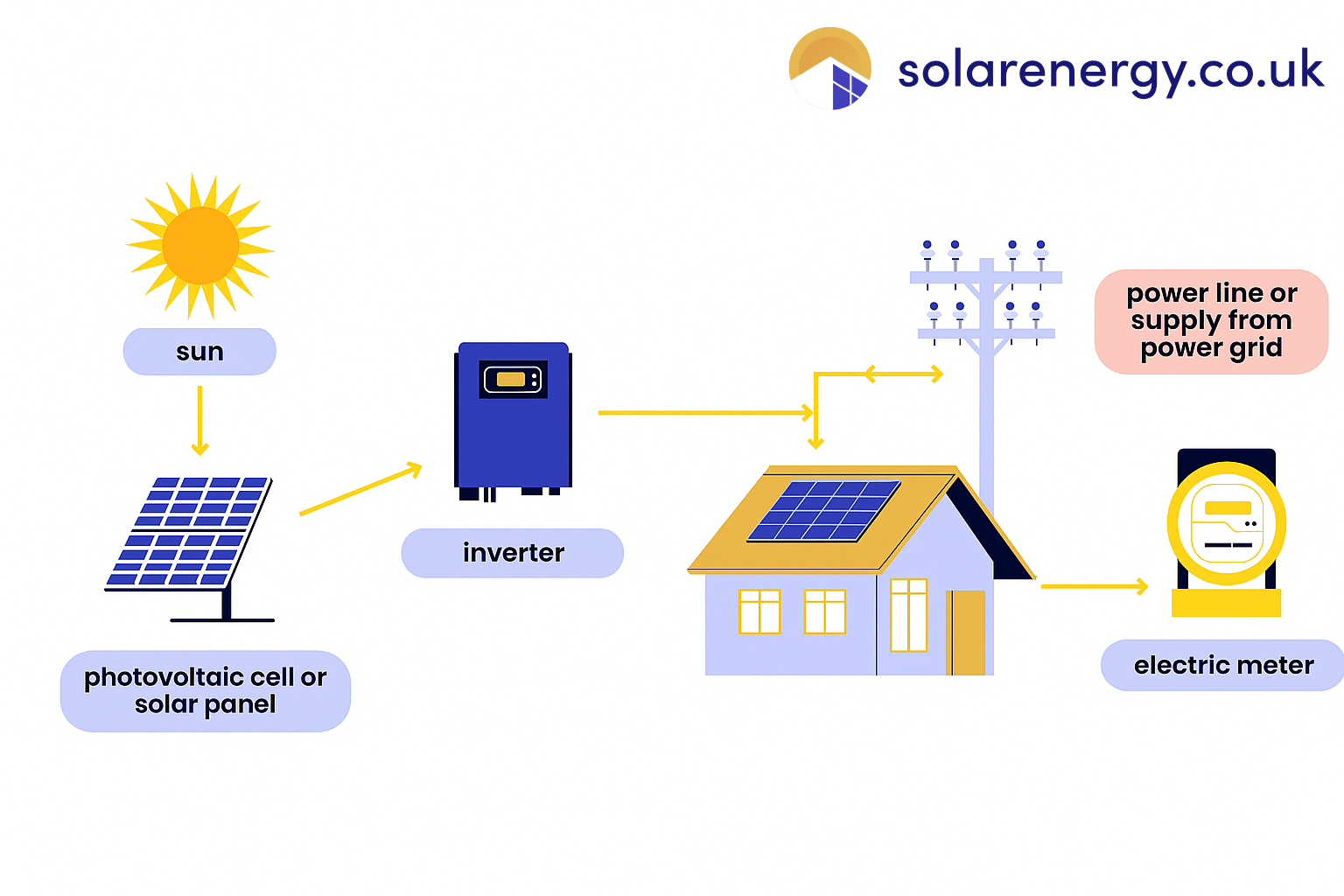How solar panels work in the UK
Solar panels convert daylight into electricity, helping you cut energy bills and get money for exporting energy back to the grid.
Fill out the form
Tell us about your solar needs and property details.
Get offers
Receive competitive quotes from qualified installers.
Pick the best
Choose the solution that fits your budget and requirements.
Solar panels, also known as photovoltaic (PV) panels convert sunlight into power. The panels consist of solar cells made from semiconductor materials - substances that can conduct electricity under the right conditions - like silicon.
When the sun shines on these cells, it triggers a process known as the photovoltaic effect which generates electric current.
The direct current (DC) generated by the panels has to be converted into alternating current (AC) electricity, so the energy can be used in your home.
Energy from the sun is abundant, and the amount of sunlight that strikes the earth's surface in an hour and a half is enough to handle the entire world's energy consumption for a full year
How solar panels work broken down into three simple steps:
- Photovoltaic effect: When sunlight hits the solar cells in a panel it excites the electrons in the semiconductor material. This movement of electrons generates a flow of electricity.
- DC to AC conversion: The flow of electricity generated by the solar cells is direct current (DC), which isn't compatible with most home appliances. The DC is converted by an inverter to alternating current (AC).
- Power Distribution: The converted AC electricity is then used to power appliances, lights, and other devices. Excess energy can be sold back to the grid via the SEG scheme or stored in a battery.

Do solar panels work in the UK climate?
Despite the UK's cloudy climate, solar panels work efficiently year-round — even without direct sunlight.
Solar panels don't need direct sun to work as they generate power from daylight, rather than sunshine.
This means that they can still produce energy on cloudy and overcast days. Furthermore they still produce power during the winter, even if panels, naturally, produce more on sunny summer days.
While there are some regional differences across the UK, with southern England typically seeing more sun than northern England and Scotland, the difference is only around 15-25 per cent for a typical 4 kW system many homes opt for.
A professional installer will help design a system specially tailored to your home, allowing you to get maximum efficiency from your new system.
Wondering how much energy your roof could generate? Get personalised quotes from certified installers in your area.
How much energy do solar panels in the UK produce?
Save up to £800 a year
Installing solar panels can drastically reduce your electricity bills – and your reliance on the grid.

On average, the UK receives between 850 and 1,200 kilowatt-hours (kWh) of solar energy per square metre per year.
A standard solar panel in the UK is around 1.6 square metres in size and rated between 300W and 400W. With panel efficiencies ranging from 15 per cent to 22 per cent, a single panel can produce approximately 250 to 400 kWh of electricity per year.
For a typical UK home with a 4kW solar system (around 10–12 panels), this could equate to 3,400 to 4,200 kWh of electricity per year — enough to cover a significant portion of an average household's annual electricity needs.
Savings on energy bills and payments for money sent back to the grid through the SEG could amount to up to £900 annually.
Get accurate projections for your specific location - connect with installers who know your area.
Begin your solar journey
Solar panels are becoming more popular and more affordable in the UK, and measures like the SEG and zero VAT until 2027 mean now is a great time to invest.
We can help you on your journey by connecting you with local installers. Our service is free and non-binding, meaning you don't have to commit to any offers you receive.
It only takes a couple of minutes to fill out our form with your details.
Get in touch with solar installers
Frequently asked questions
How long do solar panels last?
Solar panels typically last 25-30 years and come with warranties of 20-25 years.
Most panels will still produce around 80 per cent of their original capacity after 25 years.
Do I need planning permission for solar panels?
Most residential solar installations fall under permitted development rights and don't require planning permission.
However, listed buildings or properties in conservation areas may need approval.
What happens if my solar panels get damaged?
Solar panels are covered by home insurance and manufacturer warranties.
They're designed to withstand harsh weather including hail, snow, and strong winds.
Can I install solar panels myself?
While technically possible, we strongly recommend using a certified installer.
DIY installation can void warranties, may not meet building regulations, and could be dangerous due to electrical work involved.
Do solar panels require much maintenance?
Solar panels require minimal maintenance. Occasional cleaning and annual inspections are usually sufficient. Most issues are covered under warranty.
What size solar system do I need?
This depends on your energy usage, roof space, and budget.
A qualified installer can assess your needs and recommend the optimal system size for your home.
About Solarenergy.co.uk
We're a service that helps UK households find the right solar panel solution. Our experienced team makes it easy to obtain offers from multiple qualified installers.
Save time researching suppliers yourself - we bring installers directly to you, so you can choose the solution that's best for your home.








